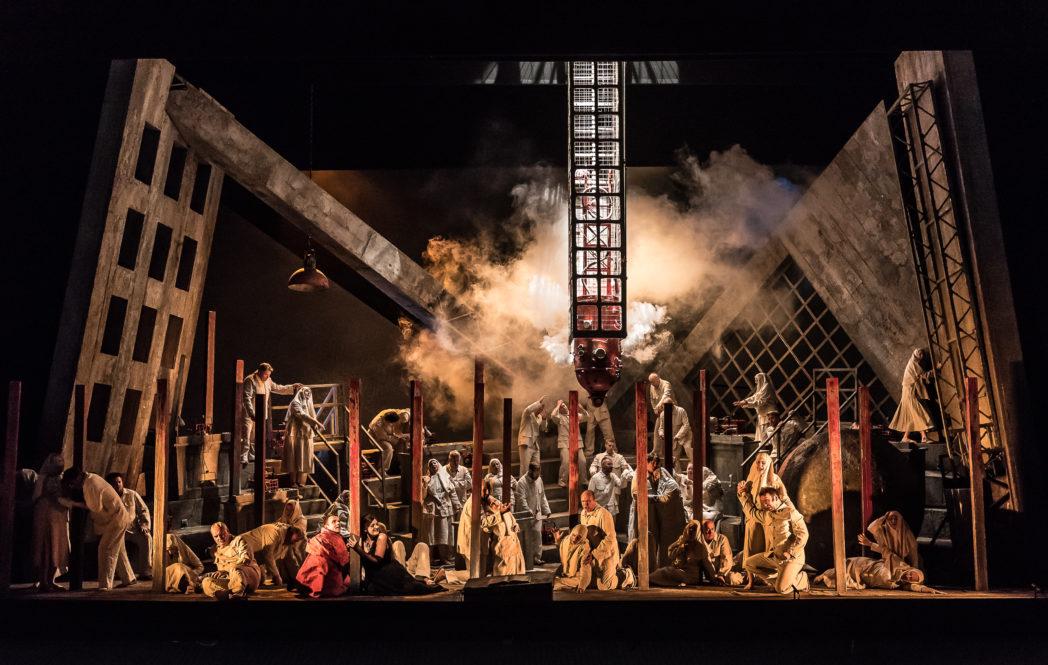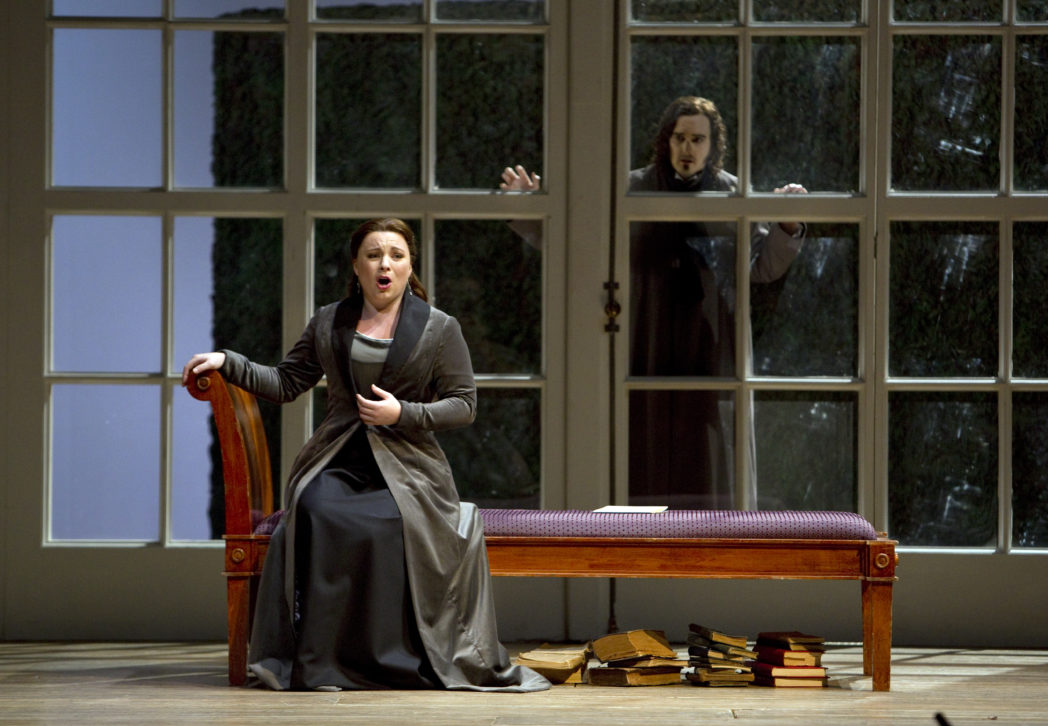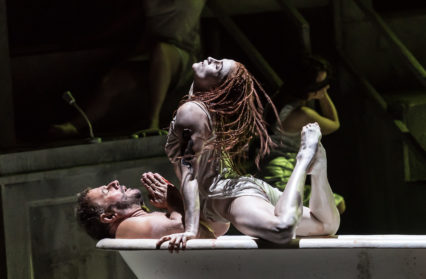Nigel Jarrett is at the Wales Millennium Centre in Cardiff for a Welsh National Opera performance of Tchaikovsky’s Eugene Onegin and Musorgsky’s Khovanshchina.
For a while now, the photographs in Welsh National Opera’s printed programmes have been enhanced with brushstrokes by the artist Howard Hodgkin. In the latest, they’re red. Or Red. Artistic director David Pountney reminds us that the company’s autumn season partly commemorates the 100th anniversary of the Russian Revolution (in red letters), a date in the calendar that provides ‘an ideal opportunity’ to examine Russian culture as part of Wales’s R17 season. ‘Opportunity’ is not synonymous with ‘excuse’, and the aforementioned season, its title Orwellian, is turning out to be a diffuse, if not fugitive, exercise. There’s never an inopportune time to embrace all things Russian. Our tendency to mark rather than celebrate bloody upheavals reflects ambivalence. It’s the blood, you see – we don’t much like it, and we continue to grapple with political ends and means.
But the issues involved, the wrongs that needed to be righted, can and should be examined. Whether or not such matters are addressed adequately in the operas chosen for WNO’s commemorative fall is debatable. All are revivals, originally staged without excuse or predicate, and, in the case of Tchaikovsky’s Eugene Onegin, with no peasants looking as though they sing, dance, and bring in the harvest with simmering rancour; peasants, in other words, far from revolting. Revolutions get to the heart of the matter; Tchaikovsky gets to the matter of the heart. Musorgsky’s Khovanshchina, if it has special merit at all, and Janáček’s From The House Of The Dead, deal with Russia’s perennial dilemmas. Sort of. If history is Strelnikov’s train, whizzing across the tundra of human lives, then Khovanshchina and From The House Of The Dead might be remote stopping-points. Eugene Onegin‘s pre-eminently self-regarding protagonists and their all-singing, all-dancing, all-stook-gathering serfs are miles from the nearest station.
In any case, Khovanshchina is at bottom a choral work in which is enmeshed a rambling story that drifts into PR flagwaving on behalf of the forces of reaction, and that at the point in this production (Pountney’s own of 2007) where not even a real flag waved as in Les Misérables can persuade us to make connections. We get close, but not close enough. While sidling up, we are diverted by oddities and longueurs. We are zapped before the interval, and detained too long after it. A 17th-century Russian power struggle updated to Revolution times has bureaucrats writing with quill pens under electric light; Prince Golitsyn, the disgraced reformer, is carried into exile seemingly Velcro-ed to one of his favourite Constructivist paintings and reading a book; Johan Engels’s set might have been built to a plan left by Vladimir Tatlin himself, and indicates the chaos and destruction of a 17th century narrative more than it does any post-Revolutionary turmoil and a disinclination to sweep up; the dastardly and defeated Prince Ivan Khovansky is despatched in a bath, but not before his Persian slave has clambered all over him legs akimbo in a case of outstaying a lascivious welcome; and the immolation of the Old Believers at the end is not death by fire at all but by gassing. (Yes, you read it correctly.)

One of the many problems with this uncompleted sprawl of an opera, here performed in the orchestration by Shostakovich, is that the violence and personal enmity – even the personal goodwill – slip too easily into generality when they are not incontrovertibly of their time, thus disengaging too often from any meaningful link with the events of a century ago. The outcome might be positive but it was still despotic Romanov. What should be clanging relevance becomes faint echo. One wag sitting near me thought the production might serve as a comment on Brexit. Now there’s a thought.
All that having been unburdened, Pountney’s production, despite its likeable eccentricities, rivets attention. If not reinforcing the events of 1917, it’s still a masterly display of imagination and visual stagecraft based on what’s happening in the pit. It is not he but Musorgsky who creates the conditions at the end in which we no longer care a fig for the characters with a claim on our sympathies. ‘Nothing can stop us meeting our Fate,’ or words to that effect, sings the soothsaying and ubiquitous Marfa to Dosifei and his fundamentalists. Oh, yes it can – the slowness, amounting to reluctance, of their journey towards it. Like the timorous policemen in The Pirates of Penzance, they don’t go. What makes the production’s revival so effective as an attempted lifesaver, apart from Pountney’s conception, is the incisive conducting of Tomáš Hanus and his orchestra’s unflagging response to it.
The singing is uniformly good, the star-billed chorus never in more stentorian voice than when pouring on to the stage throughout in the guise of this and that, or delivering themselves of vocal unity downstage and full-on. Robert Hayward fairly booms as Ivan Khovansky, rebel with a cause to unseat the Czar. Sara Fulgoni’s mezzo-soprano digs deep and holds steadily forth as mystic Marfa. Simon Bailey, as the Czar’s supporter Shaklovity, has a commanding self-righteousness, Miklós Sebestyén as Old Believer-in-chief Dosifei, an imperious self-assurance. Adrian Dwyer convinces as the dissolute Andrei Khovansky, whose chat-up routine with the Lutheran Emma (Claire Wild) involves ropes and handcuffs. Mark Le Brocq’s Golitsyn is the perfect reformer-with-a-weakness. Elena Thomas as the gymnastic Persian Slave is eye-watering. And who could not warm to Adrian Thompson’s Scribe, sung at a Sprechgesang tessitura like a character out of Brecht?

‘Ya ne sposobna k grusti tomnoy’, bleats Olga in the opening scene of Eugene Onegin (‘I am no good at languid melancholy’, or that version of it in WNO’s stage surtitles). Tchaikovsky was very good at it. Though in a less clinical sense, the Russians were – are? – too. Pushkin’s barely-plotted tale of romantic woe, on which the composer based his lyric scenes in imitation of the author’s verse-novel construction, was simply mill grist. Tchaikovsky identified with the story’s turmoil in an almost autobiographical sense, yet was able to reflect also Pushkin’s detached social criticism. That he identifies with Tatyana but in real life was more like Onegin in ditching the woman in his life is one of the opera’s ironies, perhaps its only one. It was Russian verismo when the other-worldly still held sway in European opera houses; it was a time for change and a time to reflect change.
James Macdonald’s production derives its appeal from the contrast between the heartache of its main characters and the spare surroundings in which it is played out. The seven scenes inspired designer Tobias Hoheisel to fashion a series of clean, unfussy stage pictures for the 2004 premiere at Cardiff’s New Theatre, which transferred to the Wales Millennium Centre with the company itself, and was first revived there in 2008. This is its second WMC outing. Though dominated by an all-purpose upstage arch, intended to accelerate the several curtained scene changes, they still function well in the WMC’s commodious space, focusing the audience’s attention even more closely and adding depth for most of the crowd scenes. Perhaps the soft-focus vertical rectangles projected either side of the arch represent some Rothko-like opening on to the Russian psyche. The choreography might appear routine and somewhat cramped but these party-goers are not supposed to be members of the Mariinsky’s corps de ballet on a night off. Once more WNO’s immensely able staff director Caroline Chaney is in charge, ensuring that those scenes with an almost Verdian compression retain their pace and momentum.
The singing is as choice as it ever can be in this opera. Jason Bridges invests Lensky’s duelling-ground aria with such pathos that he makes the jealous behemoth seem almost likeable. Nicholas Lester’s Onegin is more problematic: in one sense the character’s cold-fish complexity is reinforced; in another, its transformation is overwrought to the point of melodrama; but then, so is Tatyana’s, sung with no mean psychological insight by Natalya Romaniw. Miklós Sebestyén (also Dosifei in Khovanshchina) delivers his humanising paean to Tatyana, now his wife, with slowly unfolding deliberation. Claudia Huckle’s Olga is a nice contrast to her pent-up sister. The Latvian Ainārs Rubiķis steers a safe course through the score, nevertheless responding accordingly when the emotional heavens open. The chorus is fibrously strong and light-footed, and the orchestra simply surpassing.
Tchaikovsky: Eugene Onegin
Musorgsky: Khovanshchina
Wales Millennium Centre, Cardiff, October 6 & 7, 2017
Welsh National Opera
Nigel Jarrett is a freelance writer, a winner of the Rhys Davies prize for short fiction and, in 2016, the inaugural Templar Shorts award. His latest collection of stories, Who Killed Emil Kreisler?, was published last autumn. He is a regular contributor to Wales Arts Review and also reviews jazz for Jazz Journal magazine.
Header photo: Khovanshchina – Robert Hayward (Prince Khovansky); Elena Thomas (Persian Slave); credit Clive Barda/ArenaPAL



 Enjoyed this article? Support our writers directly by buying them a coffee and clicking this link.
Enjoyed this article? Support our writers directly by buying them a coffee and clicking this link.







